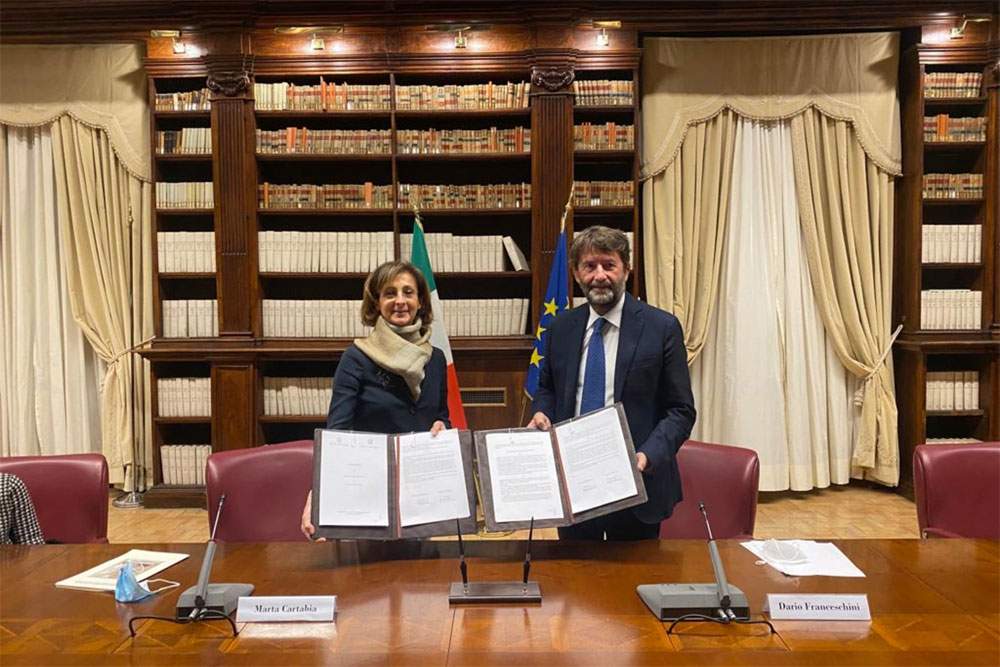The Ministry of Culture enters into a five-year agreement with the Ministry of Justice to carry out community service work at MiC premises: the agreement was signed yesterday by the two ministers, Dario Franceschini and Marta Cartabia. With the agreement, the MiC, the agreement reads, “makes available at its premises, at least 102 places for the performance of public utility work in favor of the community, for the fulfillment of the obligations under Article 168 bis of the Penal Code. The locations of the MIC at which unpaid community service may be carried out are a total of 52 located throughout the country as per the attached list, which is subject to updating.”
It will be up to the MiC offices to constantly update the Courts and the territorially competent Offices of External Criminal Execution on the situation of unpaid work positions available at their facilities in order to facilitate the orientation and initiation of defendants into public utility work.
What will be the tasks that can be performed by those admitted to public benefit work? Here they are: performance of work for the enjoyment and protection of cultural and archival heritage, including the custody of libraries, museums, galleries or art galleries; performance of work in the maintenance and enjoyment of public buildings and services, including hospitals and nursing homes, or public property and heritage assets, including gardens, villas and parks, with the exclusion of properties used by the Armed Forces or Police Forces; performance of work inherent to specific skills or professionalism of the subject. This will always, in all cases, be unpaid work. The term of the agreement between the MiC and the Ministry of Justice, five years, will be tacitly renewed.
The locations where the activities will take place are: National Museum of Matera, Archaeological Park of the Phlegraean Fields, Royal Palace of Caserta, National Museum of Cagliari, National Picture Gallery of Bologna, Royal Palace of Genoa, National Gallery of the Marches, National Roman Museum, Royal Museums of Turin, Miramare Castle of Trieste, Ducal Palace of Mantua, National Central Library of Florence, University Library of Genoa, Girolamini Complex, National Library of Naples, National Central Library of Rome, National University Library of Turin, Marciana National Library of Venice, National Library of Bari, University Library of Cagliari, Library of Casamari, Library of Cava, National Library of Cosenza, Library of Farfa, Marucelliana Library of Florence, Biblioteca Medicea Laurenziana of Florence, Isontina State Library of Gorizia, Library of Grottaferrata, State Library of Lucca, State Library of Macerata, Library of Montecassino, Library of Montervergine, University Library of Naples, University Library of Padua, University Library of Padua, University Library of Pavia, University Library of Pisa, National Library of Potenza, Praglia Library, Casanatense Library, Vallicelliana Library, University Library of Sassari, Subiaco Library, Stelio Crise Library of Trieste, Trisulti Library.
“It is important that the tool of carrying out public service work for the purpose of probation,” said Culture Minister Dario Franceschini, “finds application in places of beauty. Looking at the list of archives, libraries and museums where it will be possible to work, one can only think that this will do good for the people who will be involved. We are starting with 52 sites and 102 people, but the places of culture are many and there is ample room to expand this positive collaboration between the Ministry of Culture and the Ministry of Justice, which I am pleased is the first of its kind.”
“It is a form of vision of justice, as reparation for the damage inflicted on the community, that I find fruitful,” commented Justice Minister Marta Cartabia. “The Constitution does not speak of prison, but of the re-educational value of punishment, which finds a particularly successful expression in the ’institution of probation. And it is enhanced in the penal delegation. The benefits are many: it lightens the court load; it gives relief to detention facilities; it avoids prison passage whenever possible. And above all, it stimulates this culture of punishment, as reparation towards the offended person and the community.”
Pictured, Dario Franceschini and Marta Cartabia sign the agreement
 |
| Community service work in museums and libraries: agreement between MiC and Ministry of Justice |
Warning: the translation into English of the original Italian article was created using automatic tools. We undertake to review all articles, but we do not guarantee the total absence of inaccuracies in the translation due to the program. You can find the original by clicking on the ITA button. If you find any mistake,please contact us.